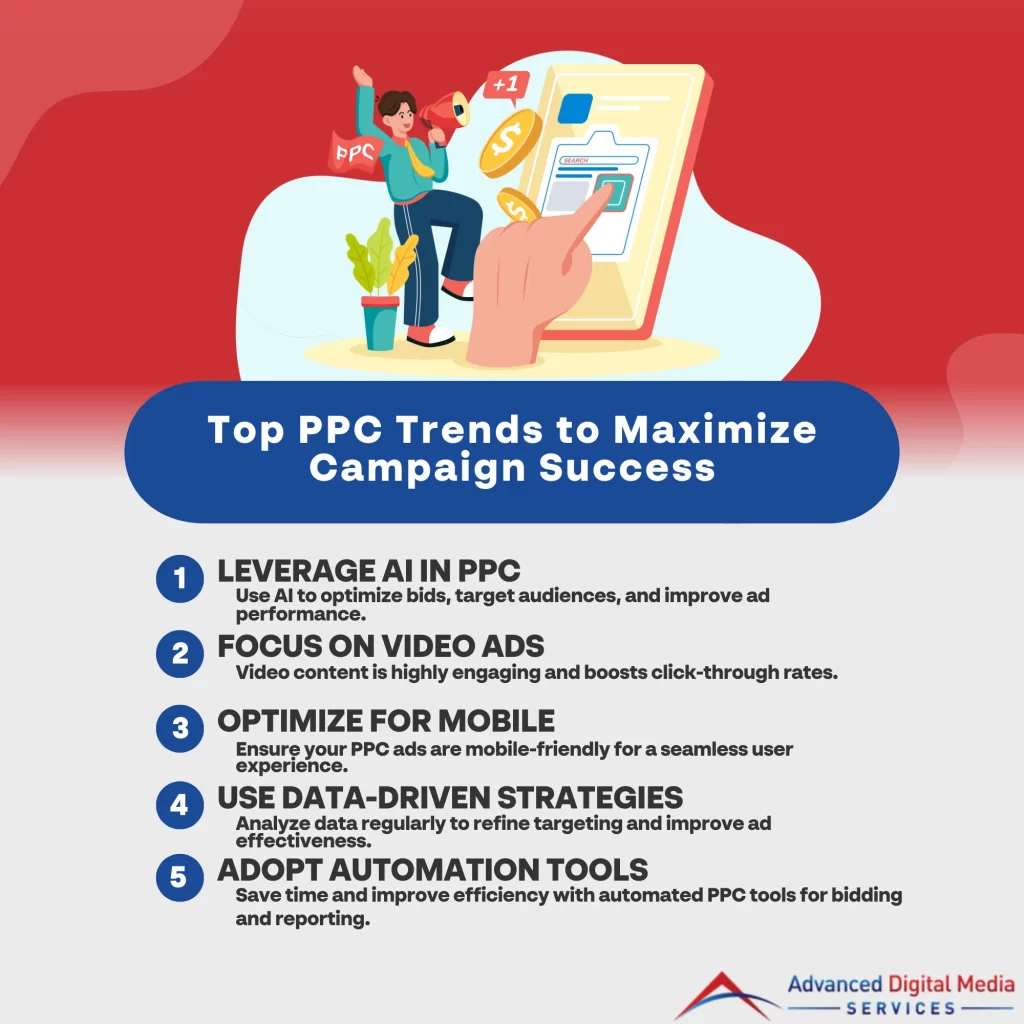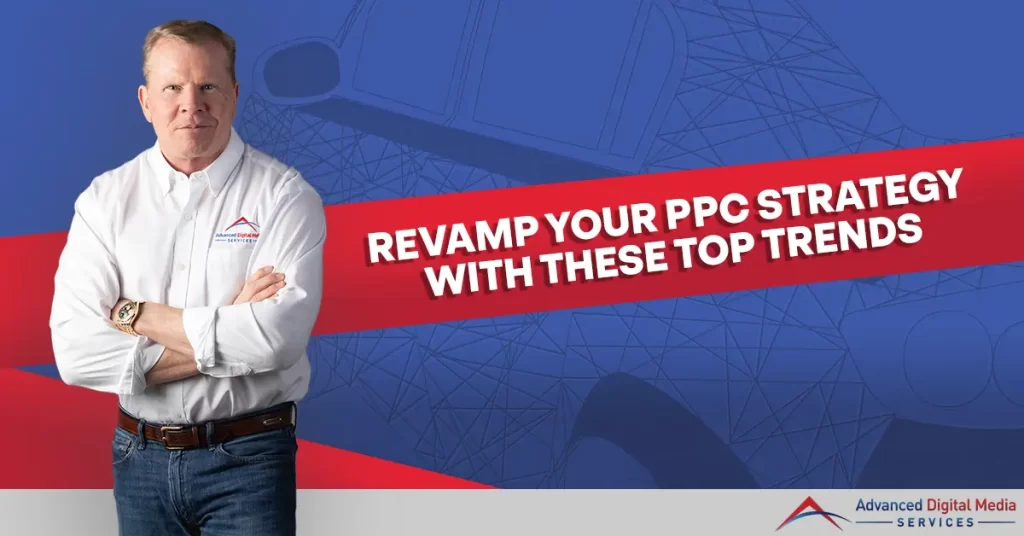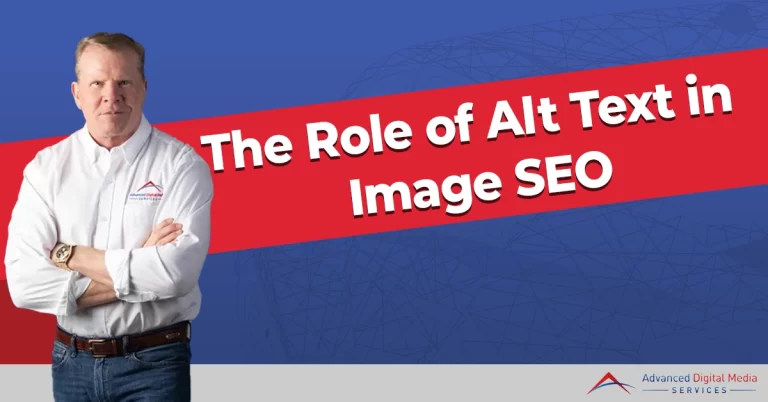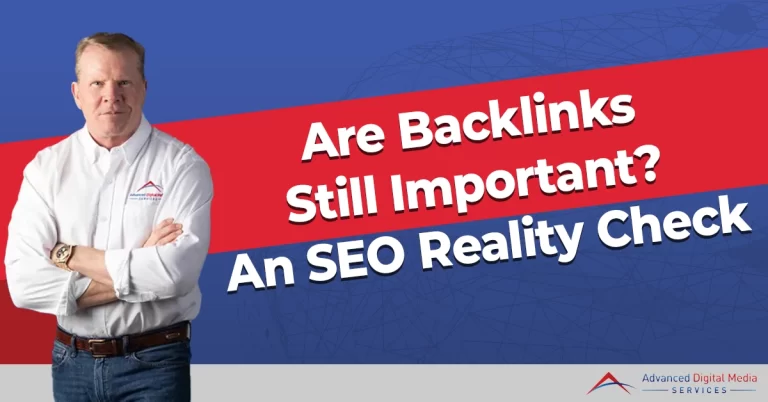To revamp your PPC strategy, focus on key trends that drive results. Incorporate video ads, which can boost engagement by up to 80% and click-through rates by 300%. Prioritize mobile optimization, as over 50% of web traffic comes from mobile devices, enhancing user experience. Leverage AI and machine learning for precise targeting and budget allocation. Integrate cross-channel messaging to strengthen your brand and improve audience targeting. Ultimately, maintain high-quality content and robust SEO practices to enhance visibility. By implementing these strategies, you can optimize your performance and future campaigns, ensuring sustained growth and success.

Key Takeaways
- Leverage video ads to increase engagement and click-through rates, enhancing the effectiveness of your PPC campaigns.
- Prioritize mobile optimization to cater to over 50% of web traffic and improve user experience.
- Implement AI and machine learning for precise targeting and budget allocation, optimizing ad performance.
- Integrate cross-channel campaigns for consistent messaging and improved audience targeting, maximizing ROI.
- Focus on high-quality content and SEO strategies to improve search visibility and foster user engagement.
Video ads
As video ads continue to dominate digital marketing trends, it’s essential to recognize their impact on consumer engagement and conversion rates. Data shows that video content can increase engagement by up to 80% compared to static ads.
In your PPC campaign management, integrating Facebook video ads can greatly enhance your outreach and effectiveness. With over 2 billion monthly active users, Facebook offers an unparalleled platform for targeting specific demographics through compelling video content.
By utilizing Facebook video ads, you can convey your brand message more dynamically, capturing attention quickly. Studies indicate that 64% of consumers are more likely to purchase a product after watching a video ad. This means that your return on investment could dramatically improve when you focus on video as part of your PPC strategy.
Moreover, employing analytics tools enables you to track engagement metrics and conversion rates from your video ads. This data-driven approach allows you to refine your campaigns continuously, ensuring that your ad spend is optimized for maximum impact.
Ultimately, leveraging video ads effectively within your PPC campaign management can lead to enhanced consumer connections and increased sales.
AI and machine learning
Harnessing the power of AI and machine learning can revolutionize your PPC strategy by enhancing targeting precision and optimizing ad performance. By leveraging advanced algorithms, you can analyze vast datasets to identify trends and patterns that inform your PPC campaign management. This not only allows for better audience segmentation but also enables real-time adjustments, ensuring your ads reach the right people at the right time.
AI tools can predict user behavior, helping you allocate your budget more effectively by focusing on high-converting segments. Machine learning algorithms continuously learn from past campaign data, allowing you to refine your targeting and bidding strategies, ultimately driving higher ROI.
Moreover, automating routine tasks with AI frees up your time to focus on strategic decision-making. You can use insights gained from machine learning to optimize ad copy, creative elements, and landing pages, enhancing user experience and conversion rates.
Incorporating AI and machine learning into your PPC campaign management not only streamlines operations but also positions you at the forefront of digital marketing innovation. Embrace these technologies to elevate your campaigns and achieve measurable success.
Cross-channel integration
Cross-channel integration is essential for maximizing the efficiency of your PPC campaigns. It refers to the seamless coordination of your marketing efforts across various platforms, ensuring that your messaging is consistent and impactful.
By implementing effective cross-channel integration, you can greatly enhance your marketing campaign management and drive better results. Here are four key benefits:
- Unified Messaging: Achieve brand consistency across channels, which strengthens consumer recognition and trust.
- Improved Targeting: Leverage data from multiple channels to refine audience targeting, ensuring your ads reach the most relevant users.
- Enhanced Performance Tracking: Monitor and analyze performance data across platforms, enabling you to make informed decisions and optimize campaigns dynamically.
- Increased ROI: By integrating channels, you can allocate budgets more effectively, optimizing your ad spend for maximum returns.
Incorporating cross-channel integration definition principles into your strategy allows you to create a cohesive user experience, ultimately boosting engagement and conversion rates.
As you adapt to this trend, you’ll find that your PPC campaigns not only perform better but also contribute to a more robust overall marketing strategy.
Mobile optimization
While many businesses prioritize desktop experiences, neglecting mobile optimization can greatly hinder your PPC campaign‘s effectiveness. With over 50% of all web traffic coming from mobile devices, it’s essential to tailor your ads for mobile users. A well-executed mobile optimization strategy can lead to higher click-through rates (CTR) and improved conversion rates.
To kick off your mobile optimization efforts, analyze your current PPC performance data. Identify which keywords drive the most traffic on mobile versus desktop. This data can inform your bidding strategy, ensuring you allocate budget effectively where it’s most impactful.
Additionally, consider implementing responsive ad formats that adapt to various screen sizes, enhancing user experience.
Don’t forget about the role of SEO mobile optimization in your strategy. Optimize landing pages for mobile users by ensuring fast load times and easy navigation. Google prioritizes mobile-friendly sites in search rankings, meaning better SEO can boost your PPC efforts.
Incorporating these elements into your strategy won’t only align with user behavior but also improve your overall PPC performance. Keep mobile optimization at the forefront of your campaign planning to stay competitive in today’s digital landscape.
Remarketing
How can you effectively re-engage users who’ve previously interacted with your brand? Remarketing is your answer. It’s a strategic approach that allows you to reconnect with potential customers, driving them back to your website and boosting conversions.
By employing targeted ads, you can remind users of your offerings, making them more likely to complete a purchase.
Consider these four strategies to enhance your remarketing efforts:
- Segment Your Audience: Tailor your campaigns based on user behavior. For instance, target users who abandoned their cart differently than those who visited specific product pages.
- Utilize Dynamic Ads**: Show personalized ads featuring products users viewed, increasing relevance and engagement.
- Implement Frequency Caps**: Avoid overwhelming your audience. Control ad exposure to maintain interest without causing annoyance.
- Leverage PPC Campaign Management Services**: Collaborate with experts to optimize your campaign management strategy and maximize your ROI.
Keyword research
Keyword research is essential for crafting a successful PPC strategy, as it helps you identify the terms and phrases your target audience uses when searching online. By leveraging data-driven insights, you can strategically select keywords that align with user intent and maximize your ad visibility.
Start by analyzing search volume, competition, and click-through rates to pinpoint high-performing keywords.
In the era of mobile search optimization, it’s vital to evaluate how your audience interacts with search engines on their devices. Focus on long-tail keywords that reflect typical mobile queries, as these often yield higher conversion rates.
Incorporate tools like Google Keyword Planner to refine your keyword list, ensuring it meets the specific needs of your target demographic.
Effective pay per click campaign management hinges on continuous monitoring and adjustment. Track your keyword performance regularly, and be prepared to pivot your strategy based on real-time analytics.
This proactive approach not only enhances your ad relevancy but also optimizes your budget, allowing you to achieve better ROI. Stay ahead of trends, and don’t underestimate the power of precise keyword research in driving your PPC success.
Search engine optimization (SEO)
Building on effective keyword research, search engine optimization (SEO) plays a crucial role in enhancing your online visibility and attracting organic traffic.
By employing strategic techniques, you can guarantee your website ranks higher on search engine results pages (SERPs), which directly impacts your business growth. Here are four essential factors to take into account:
- Mobile Optimization: With the rise of mobile browsing, implementing search engine optimization mobile strategies is fundamental. Google prioritizes mobile-friendly sites, so verify your website is responsive and loads quickly.
- Quality Content: High-quality, relevant content keeps users engaged and encourages backlinks, which are critical for SEO success.
- On-Page SEO: Optimize title tags, meta descriptions, and headers to align with your targeted keywords. This helps search engines understand your content better.
- SEO Campaign Management Software: Utilizing advanced tools can streamline your SEO efforts, track performance, and adapt strategies based on data insights.
Incorporating these elements into your SEO strategies won’t only enhance your online presence but also drive sustainable traffic, ultimately boosting your bottom line.
Campaign management
In the domain of digital marketing, effective campaign management is essential for translating strategy into measurable results. You need to closely monitor your key performance indicators (KPIs) to gauge the success of your campaigns. This means analyzing data from mobile search engine optimization to guarantee your ads are optimized for users on the go.
With the increasing prevalence of mobile devices, if your ads aren’t tailored for mobile users, you risk losing significant traffic and conversions.
Additionally, incorporating video ads into your campaigns can yield impressive engagement rates. Studies show that video content can increase click-through rates by up to 300%. Make certain to track these metrics to understand which formats resonate best with your audience.
Using A/B testing within your campaign management can further refine your strategy. By experimenting with different ad copies, visuals, and targeting options, you can pinpoint what works best.
Frequently Asked Questions
How Can I Measure the Success of My PPC Campaigns?
To measure your PPC campaign’s success, track key metrics like click-through rates, conversion rates, and return on ad spend. Analyze data regularly to adjust strategies, ensuring you’re maximizing your budget and achieving desired results efficiently.
What Budget Should I Allocate for PPC Advertising?
You should allocate 10-20% of your overall marketing budget for PPC advertising. Analyze your previous campaign performance and adjust based on ROI, ensuring your budget aligns with business goals and competitive landscape.
How Often Should I Review My PPC Strategy?
Think of your PPC strategy as a garden; regular reviews help it flourish. You should assess it monthly, adjusting bids and keywords based on performance data to guarantee your advertising efforts bloom effectively and efficiently.
What Common Mistakes Should I Avoid in PPC Management?
In PPC management, avoid common mistakes like neglecting keyword research, ignoring negative keywords, and failing to track conversions. Regularly analyze performance data, adjust bids strategically, and optimize ad copy to enhance your campaign effectiveness.
How Do PPC and SEO Work Together Effectively?
You might think PPC and SEO compete, but they actually complement each other. By aligning strategies, you boost visibility, optimize spend, and drive organic traffic, creating a more robust online presence that enhances overall performance.
Conclusion
Revamping your PPC strategy means embracing video ads for engagement, leveraging AI and machine learning for efficiency, and integrating cross-channel efforts for consistency. It means optimizing for mobile users, utilizing remarketing to recapture interest, and conducting thorough keyword research to target effectively. By prioritizing search engine optimization and streamlining campaign management, you can drive better results. Stay data-driven, stay strategic, and watch your PPC efforts transform into a powerful tool for growth and success in your marketplace.






